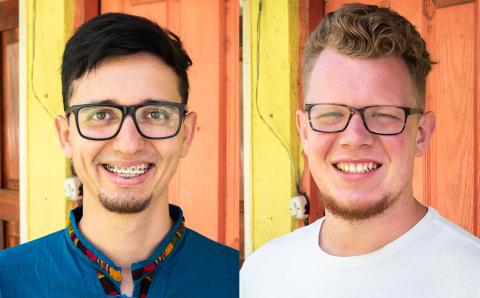Some people call it emotional intelligence. Others call it social perception. Whatever you call it, truly understanding other people is a multidimensional task.
In my role within the Christian Reformed Church, I’m often part of conversations that center around how older generations of church leaders can better listen to young people in order to keep them in our churches. I wonder, though, if a first step to this relationship ought to be trying to see ourselves as young people see us.
If you are a younger person, I suspect you’ve spent some time thinking about what older generations think of you. We’ve all heard stereotypes about Millennials and Gen Zers. You might disagree that these stereotypes hold true for you as an individual, but you probably know they exist.
I wonder, though, if those of us in the middle of the family years, those who have become empty-nesters, or those well into their retirement years have spent any time thinking about this same thing. Have we ever wondered what younger generations think about us? What do they think we view as important? What do they hear us say?
Calvin University Chaplain Mary Hulst shared a few of these insights with those who attended Inspire 2019 in Windsor, Ont., in August. Many young adults, she said, are acutely aware about issues related to the environment. They are willing to consume less, live in tiny homes, and spend more for products from socially and environmentally responsible companies because they believe their lives should live out the values they have been taught about Christian stewardship.
Yet these same young adults rarely hear sermons about caring for the environment preached from the pulpit. They see congregations using disposable coffee cups for their fellowship times, and they witness older generations seeming to consume without thought about the environmental impact. What do you think this communicates about our commitment to Christian stewardship?
Similarly, Hulst challenged older generations to think about how we talk and act around issues of sex, politics, race, and justice. In some cases we don’t talk about these things at all. That leaves young people to try to figure things out for themselves from the social norms around them.
When we do talk about these issues, we often proclaim from a place of certainty, as if we have everything figured out. Yet our actions don’t always match what we have stated. We might say, for example, that we value diversity and that all people are God’s children, yet the ranks of our elders and the people in our pews do not reflect the diversity that young people see in their schools, work, or community.
We teach sexual purity, yet we don’t talk about how to deal with singleness in your 20s or 30s. We don’t offer prayers of confession for those who have looked at online pornography, and we don’t talk about how to respond to the LGBTQ members in our midst. What does this communicate about our values and our relevance in today’s society?
There are many other examples I could share. The point is this: before we can seek to hear what young people and young adults in church have to say, we need to get in their shoes and see what they see. I suspect this will help us all shift from places of certainty and polarization to places where we can ponder and work together as we seek God’s kingdom.
About the Author
Steven Timmermans served as the executive director of the Christian Reformed Church in North America from 2014 to 2020.
Steven Timmermans se desempeñó como director ejecutivo de la Iglesia Cristiana Reformada en América del Norte de 2014 a 2020.
Steven Timmermans는 2014 년부터 2020 년까지 북미에서 기독교 개혁 교회의 집행 이사로 재직했습니다.







